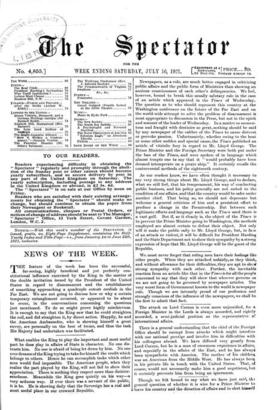Newspapers, as a rule, are much better engaged in criticizing
publics affairs and the public form of Ministries than showing an anxious consciousness of each other's delinquencies. We feel, however, bound to break this usually salutary rule in the case of an -article which appeared in the Tines of Wednesday, The question as to who should represent this country at the Washington conference on the future of the Far East and on the world-wide attempt to solve the problem of disarmament is most appropriate to discussion in the Press, but not in the spirit and manner of the leader of Wednesday. In a matter so momen- tous and fraught with destinies so great, nothing should be said by any newspaper of the calibre of the Times to cause distrust or provoke passion. Unfortunately, whether owing to the heat or some other sudden and special cause, the Times published an article of 'vitriolic fury in regard to Mr. Lloyd George. The Prime Minister and the Foreign Secretary were both put under the ban of the Times, and were spoken of in language which almost tempts one to say that it "would probably have been deemed intemperate on a pirate ship." It certainly recalls the controversial methods of the eighteenth centuiy.






























